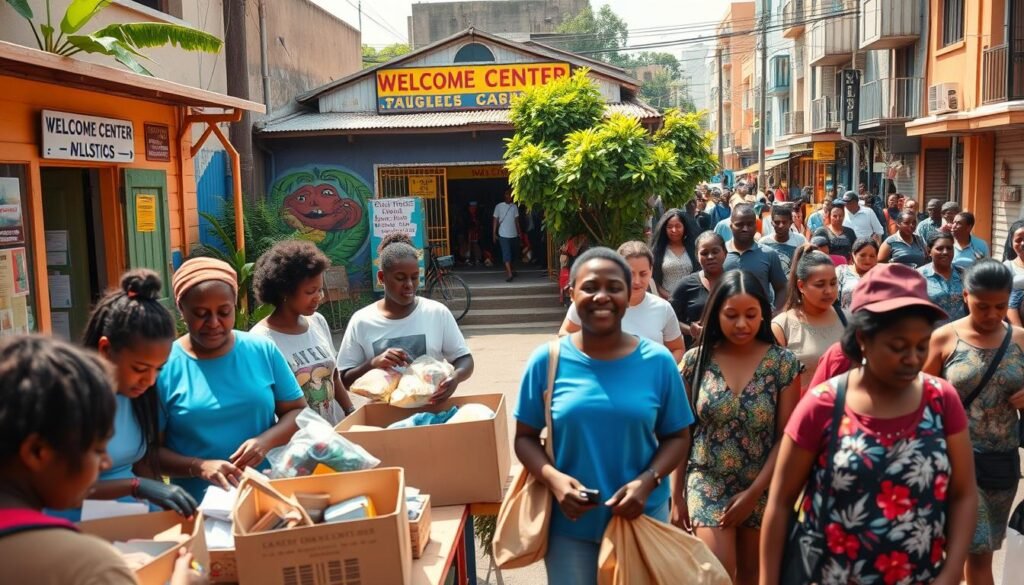Physical Address
304 North Cardinal St.
Dorchester Center, MA 02124
Physical Address
304 North Cardinal St.
Dorchester Center, MA 02124

Explore the Haitian immigration crisis in the U.S. and learn how to make your voice heard.
The recent surge in Haitian immigration to the United States has sparked a heated debate about U.S. immigration policy and the need for comprehensive immigration reform.
As the situation continues to unfold, it’s essential for individuals to understand the complexities of the issue and the ways in which they can make a difference.
By staying informed and advocating for change, citizens can help shape a more equitable and just immigration policy that addresses the needs of Haitian immigrants and the broader community.
The Haitian immigration crisis is a pressing issue in the United States, with recent statistics showing a significant surge in migration. This phenomenon is multifaceted, involving various factors that contribute to the complexity of the situation.
Recent data indicates a substantial increase in Haitian migrants attempting to cross the U.S.-Mexico border. This trend is driven by a mix of economic hardship, political instability, and natural disasters in Haiti. The migration patterns are not limited to a specific route; many Haitians travel through various countries before reaching the U.S. border.
The surge in Haitian migrants has resulted in significant challenges at the U.S.-Mexico border. Overcrowding and lengthy processing times have become common issues, leading to concerns about the treatment and welfare of the migrants. The U.S. Customs and Border Protection (CBP) faces the daunting task of managing the flow of migrants while ensuring that asylum processes are followed.
Media coverage of the Haitian immigration crisis has been extensive, with various outlets providing different perspectives on the issue. Public perception is influenced by these reports, with some calling for more stringent immigration policies and others advocating for humanitarian aid. The role of media in shaping public opinion is crucial, as it can influence policy decisions and public discourse.
To grasp the nuances of Haitian migration, it’s essential to explore the historical ties between Haiti and the U.S. The relationship between these two nations has been complex, influencing not only diplomatic relations but also migration patterns.
The history between Haiti and the U.S. dates back to the early 19th century when Haiti gained independence. Over the years, the U.S. has played a significant role in Haitian affairs, sometimes through diplomatic support and other times through military intervention. This intricate relationship has shaped Haitian perceptions of the U.S. and influenced migration decisions.
Haitian migration to the U.S. is not a new phenomenon. There have been several waves, often triggered by political instability, natural disasters, or economic hardship in Haiti. For instance, the Duvalier regime in the mid-20th century led to a significant influx of Haitian refugees. Understanding these patterns helps in grasping the current crisis.
U.S. immigration policies toward Haitians have evolved significantly over the decades, influenced by both domestic politics and international relations.
Different U.S. administrations have handled Haitian immigration differently. For example, during the Clinton administration, Haitian refugees were more likely to be granted asylum compared to during the Bush administration, where policies became more restrictive.
There have been notable disparities in how Haitian immigrants are treated compared to other groups. These disparities often reflect broader U.S. immigration policies and attitudes toward different nationalities.
The historical context of Haiti-U.S. relations and migration patterns reveals a complex interplay of factors that have led to the current immigration crisis. By understanding this history, we can better advocate for policies that address the root causes of migration and support those seeking refuge.
Understanding the root causes of the current Haitian immigration crisis requires examining the interplay of political, environmental, and economic factors. The situation in Haiti is complex, with multiple challenges that have driven many to seek better lives elsewhere.
Haiti has a long history of political turmoil, which has significantly contributed to the current crisis. The country has experienced numerous periods of instability, including coups, protests, and governmental crises. For instance, the assassination of President Jovenel Moïse in 2021 plunged the nation into further uncertainty.
Key factors include:
Haiti is prone to natural disasters, which have had devastating impacts on its infrastructure, economy, and people’s lives.
The 2010 earthquake was catastrophic, killing hundreds of thousands and displacing millions. The 2021 earthquake further exacerbated the situation, causing additional loss of life and infrastructure damage.
Climate change has led to increased frequency and severity of natural disasters in Haiti, including hurricanes and droughts. Rising temperatures and unpredictable weather patterns have affected agricultural productivity, further straining the economy.
As noted by a recent report, “Climate change is not just an environmental issue; it’s a human rights issue, especially for vulnerable communities like those in Haiti.”
Economic hardship is a significant driver of immigration. Haiti is one of the poorest countries in the Western Hemisphere, with high unemployment rates and limited economic opportunities.
“The lack of economic prospects in Haiti forces many to seek opportunities elsewhere, often risking their lives in the process.”
The combination of political instability, natural disasters, and economic hardship creates a challenging environment that prompts many Haitians to migrate. Understanding these root causes is crucial for developing effective solutions to the current crisis.
As the Haitian immigration crisis continues to unfold in the United States, it’s imperative that we explore ways to collectively address this complex issue. The situation demands a thoughtful and multi-faceted response, one that involves not just policymakers but the community at large.
Collective action has long been a cornerstone of social change in the United States. By coming together, individuals can amplify their voices and influence policy decisions that impact the lives of Haitian immigrants. This collective effort can take many forms, from grassroots organizing to participating in advocacy campaigns.
One of the key benefits of collective action is its ability to bring attention to issues that might otherwise be overlooked. By raising awareness about the challenges faced by Haitian immigrants, communities can build support for policies that are more inclusive and equitable.
Advocacy plays a crucial role in shaping immigration policy. By advocating for the rights and needs of Haitian immigrants, individuals and organizations can help ensure that policies are fair and just. This involves not just lobbying policymakers but also educating the public about the importance of immigration reform.
Effective advocacy can lead to significant changes in how immigration policies are formulated and implemented. It can help to humanize the immigration debate, highlighting the stories and struggles of real people rather than just statistics.
There are numerous examples of successful community mobilization efforts that have made a tangible difference in the lives of immigrants. For instance, community-led campaigns have resulted in the provision of legal aid, healthcare access, and educational opportunities for Haitian immigrants.
These success stories underscore the potential of collective action and advocacy. They demonstrate that when communities come together, they can achieve meaningful change and create a more just and equitable society for all.
Understanding the legal framework surrounding Haitian immigration is crucial for addressing the current crisis. The complexities of U.S. immigration policies directly impact the lives of Haitian immigrants.
Current immigration policies in the U.S. have significant implications for Haitian immigrants. Policies often change, creating uncertainty and challenges for those seeking to navigate the system. For instance, the administration’s stance on immigration can either facilitate or hinder the process of seeking asylum or obtaining legal status.
As U.S. Citizenship and Immigration Services (USCIS) handles immigration cases, understanding these policies is vital. The policies dictate the procedures for applying for asylum, TPS, and other forms of relief.
TPS has been a critical form of relief for many Haitians, allowing them to remain in the U.S. without fear of deportation due to conditions in their home country.
“TPS is a vital lifeline for individuals who cannot safely return to their home country due to ongoing armed conflict, environmental disaster, or other extraordinary conditions.”
The designation of TPS for Haiti has been a subject of policy debate, with implications for thousands of Haitians living in the U.S. The future of TPS remains uncertain, affecting the lives of many.
The asylum process is another critical area where legal challenges arise. Haitians seeking asylum face numerous barriers, including lengthy processing times and stringent eligibility criteria. The process is often fraught with challenges, making it difficult for applicants to secure protection.
Moreover, changes in asylum policies can significantly impact the number of applicants who are successful. Understanding these processes is essential for advocacy and support efforts.
Legal precedents and court decisions play a significant role in shaping immigration policy and the experiences of Haitian immigrants. Court rulings can either uphold or challenge existing policies, affecting the lives of many.
For example, decisions regarding TPS and asylum policies can have far-reaching implications. Staying informed about these developments is crucial for those affected and for advocates working to support Haitian immigrants.
The plight of Haitian immigrants in the U.S. highlights significant humanitarian concerns and human rights violations. As they navigate the complexities of the immigration system, they face numerous challenges that impact their well-being and dignity.
One of the most pressing issues is the condition of detention facilities and the practice of family separation. Detention conditions have been criticized for being inhumane, with reports of overcrowding, inadequate sanitation, and insufficient medical care. “The conditions are so dire that they violate basic human rights,” notes a recent report. Family separation, a consequence of strict immigration policies, has also caused significant trauma, particularly among children.

Access to legal representation is another critical concern. Many Haitian immigrants face significant barriers in obtaining legal counsel, which is crucial for navigating the complex asylum and immigration processes. Lack of access to legal representation can lead to unjust outcomes, including wrongful deportations.
Health and safety concerns are paramount among Haitian immigrants. The challenges they face can be categorized into physical and mental health issues.
Haitian immigrants often suffer from physical health challenges, including malnutrition, infections, and other conditions exacerbated by poor detention conditions and lack of access to adequate healthcare.
The trauma experienced by Haitian immigrants, including those separated from their families and those subjected to harsh detention conditions, leads to significant mental health and trauma. The long-term psychological impact can be severe, requiring specialized care and support.
As we consider the humanitarian concerns and human rights issues surrounding Haitian immigration, it becomes clear that a comprehensive and compassionate approach is needed to address these challenges effectively.
Immigration reform advocacy involves several key strategies, such as contacting elected officials, supporting organizations that champion immigrant rights, and utilizing social media platforms. These efforts are crucial in shaping policies that affect Haitian immigrants and other communities.
One of the most direct ways to influence immigration policy is by contacting your elected representatives. This can be done through phone calls, emails, or letters. Making your voice heard can significantly impact the decisions made by lawmakers.
To start, you need to identify who your representatives are. You can do this by visiting the official government websites or using online tools that help you find your representatives based on your location.
When reaching out, it’s essential to craft a clear and concise message. Be sure to state your position clearly and provide personal stories or relevant data to support your argument. This makes your communication more impactful.
| Method | Advantages | Tips |
|---|---|---|
| Phone Call | Immediate response, personal touch | Be prepared to be brief, leave a clear message |
| Provides a paper trail, can be detailed | Use a clear subject line, be concise | |
| Letter | Formal, leaves a lasting impression | Use proper salutations, sign your name |
Organizations dedicated to immigrant rights play a vital role in advocacy. By supporting these organizations, either through donations or volunteering, you can contribute to their efforts in advocating for policy changes.
Community organizing involves bringing people together to advocate for a common cause. Building coalitions with other groups can amplify your message and increase your impact. Collaboration is key in creating a strong, unified front for immigration reform.
Social media platforms are powerful tools for advocacy. They allow you to reach a wide audience and mobilize support quickly. By sharing informative content, personal stories, and calls to action, you can engage your network in the cause.
Effective advocacy for immigration reform requires a combination of these strategies. By engaging with elected officials, supporting immigrant rights organizations, participating in community organizing, and leveraging social media, individuals can make a significant difference in shaping immigration policies.
To effectively support Haitian immigrants, individuals can explore various avenues such as volunteer opportunities, donation channels, and legal aid services. By taking direct action, we can make a significant difference in their lives.
Volunteering is a crucial way to support Haitian immigrants. There are several areas where volunteers can make a significant impact.
Many local organizations that support Haitian immigrants rely heavily on volunteers. These organizations often need help with daily operations, events, and providing services to the community.
Individuals can also offer their specific skills to organizations that support Haitian immigrants. For example, legal professionals can provide pro-bono services, while medical professionals can offer health services.

Donations are vital for organizations that support Haitian immigrants. These can include financial donations, clothing, food, and other essential items.
| Type of Donation | Description | Benefit |
|---|---|---|
| Financial Donations | Monetary contributions to organizations | Helps organizations fund their operations and services |
| Clothing and Essentials | Donations of clothing, food, and other necessities | Provides immediate relief to Haitian immigrants |
Providing legal aid is crucial for Haitian immigrants navigating the complex U.S. immigration system. Organizations offering legal services help immigrants understand their rights and options.
“Legal aid is not just about providing legal representation; it’s about giving people the knowledge and tools they need to navigate a complex system.” –
Educating the public about the challenges faced by Haitian immigrants is essential for creating a supportive community. Awareness campaigns can help dispel myths and foster understanding.
By taking these practical steps, we can work towards a more inclusive and supportive environment for Haitian immigrants.
The Haitian immigration crisis in the U.S. is a complex issue that requires a comprehensive and compassionate response. Throughout this article, we have explored the historical context, root causes, and current challenges faced by Haitian immigrants. It is clear that building a just immigration system is crucial to addressing this crisis.
By understanding the complexities of the issue and the need for immigration reform, we can work towards creating a more equitable and just system. Collective action and advocacy are essential in driving positive change and ensuring that the rights of Haitian immigrants are protected.
As we move forward, it is essential to continue raising awareness, supporting immigrant rights organizations, and advocating for policy changes that promote a more just and inclusive immigration system. By working together, we can create a brighter future for Haitian immigrants and the communities they serve.
The current state of Haitian immigration to the United States is complex, with recent statistics showing an increase in migration patterns, challenges at the border, and varying media coverage that influences public perception.
The root causes of the Haitian immigration crisis include political instability, violence, natural disasters, and economic hardship in Haiti, which have led to a surge in migration to the United States.
You can support Haitian immigrants by volunteering with local organizations, donating to reputable charities, providing legal aid, and participating in educational initiatives and awareness campaigns.
Temporary Protected Status (TPS) is a temporary immigration status granted to eligible nationals of designated countries, including Haiti, allowing them to remain in the United States without fear of deportation; TPS has a significant impact on Haitian immigrants, providing them with a sense of security and stability.
You can contact your elected officials by finding their contact information on their official websites, crafting effective messages that clearly state your concerns and proposed solutions, and reaching out to them via phone, email, or mail.
Effective advocacy strategies for immigration reform include contacting elected officials, supporting immigrant rights organizations, engaging in community organizing and coalition building, and using social media to raise awareness and mobilize action.
Humanitarian concerns related to Haitian immigration include detention conditions, family separation, access to legal representation, and health and safety concerns, such as physical health challenges and mental health and trauma.